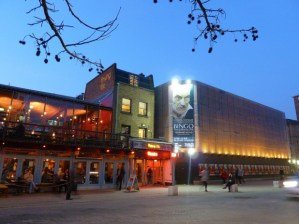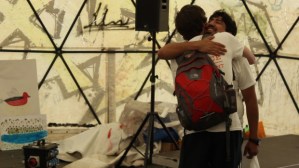Review: The Jungle (Young Vic)
Set in the Calais Jungle, this new piece is devised by Good Chance Theatre founders Joe Murphy and Joe Robertson
It starts as you walk in and find yourself seated at makeshift tables and benches with rough ground underfoot. You are assigned an area. I was in Afghanistan which was appropriate (although I could have been in Sudan, Ethiopia, Syria or many other lands where peoples have been displaced) because the Young Vic has been transformed into the simulacrum of an Afghan restaurant that was one of the semi-permanent structures that sprang up in the Calais Jungle.
Suddenly there is a lot of shouting and people running around with clipboards, screaming that the authorities are about to demolish the camp and enforce evictions of the thousands of refugees (many of them unaccompanied children) who were living there, seeking their chance to come to Britain. Then the ferocious outline of a French policeman, in full battle gear, is silhouetted in white light.
And I feel very cross. For goodness sake. I am a comfortable, bien-pensant theatre-goer. I am not sitting in a makeshift camp. I am not in danger of eviction. This is a ridiculous way to spend a Friday night.
Then , just as suddenly, I am not feeling that anymore. I am completely engrossed in the story that rewinds to the beginning of the camp in 2015 and the way that men and women from many countries and of many religions began to forge a way of living together while they waited for a "good chance" to stow away and come to the UK to claim asylum. Their harrowing stories of flight towards the hope of a better life begin to unfold. And as they do, faces emerge from the mass of noise to become individuals about whom it is impossible not to care.
In this way, this remarkable show, in its shape and structure, mimics the journey of compassion needed to see beyond the statistics and the shouted headlines, beyond the apathetic gaze of governments towards a humanitarian catastrophe, and see the complicated, flawed, fascinating individuals involved. It is exactly the trajectory we all need to go on.
The Jungle was devised by Joe Murphy and Joe Robertson, who know what they are talking about. They are the founders of the Good Chance theatre, which opened in the camp alongside the shops and the restaurant, the mosques, the nightclub and the church. Some of the actors have backgrounds as refugees; all of them display an identification with their plight that enables them to give close-up performances of remarkable intensity.
What makes The Jungle so extraordinary is partly that closeness, that sense of intimacy with terrible suffering. Powerfully directed by Stephen Daldry and Justin Martin, its effects are simple but finely-honed; the beams of a torch become the sharpest spotlight on man’s inhumanity to man but also on the constant nobility that ordinary people can sometimes discover within themselves.
But its quality also lies in the way it refuses to make anything simple. Of course the English volunteers who arrive to help are driven by a desire to make things better, but their bossy insistence on their own form of democracy stands in sharp contrast to the decision of the refugee leaders "not to vote but to agree."
In the same way, the camp’s inhabitants themselves are showed in all their rounded humanity. We begin to understand their stories and empathise with their struggle: that of Salar (Ben Turner) who runs the restaurant and distrusts the British who have destroyed his village three times in the past century; young Okot (John Pfumojena) who, in the play’s single most moving scene, explains how his journey has changed him, obliterating the person he was, even though he is still only 17; our guide Salfi (Amma Haj Ahmed), a Syrian student of English literature who is made desperate by his inability to leave Calais and who is still desperate even when he reaches Britan.
There are no easy answers to any of it. The play is messy and inconclusive, like the political situation that is driving this terrible crisis. But it demands that we face what is going on. A silent child drifts through the action like an accusing wraith; at the close, we witness a report from the camp today, a place where no structure is allowed but people still live, seeking help and refuge.
It is searing, emotional and profound. It makes you think and feel in a way that theatre very rarely does. It is quite the most moving, involving and important show you are likely to see this Christmas.
The Jungle runs at the Young Vic until 6 January 2018.















